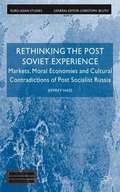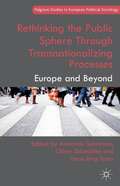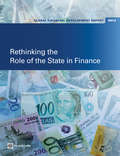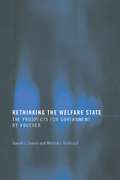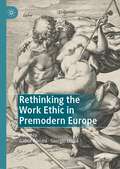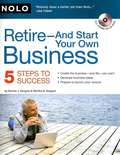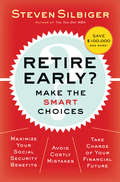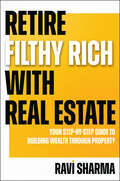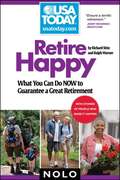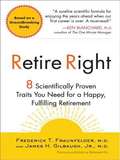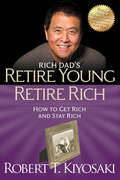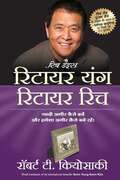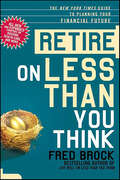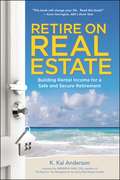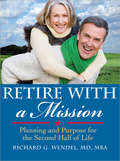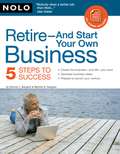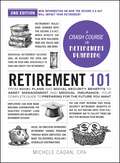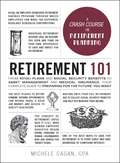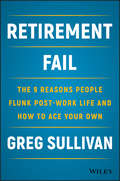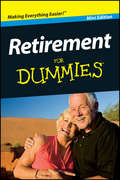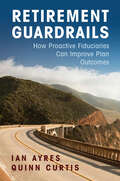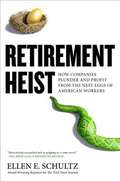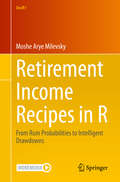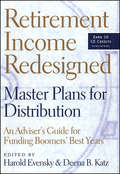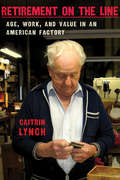- Table View
- List View
Rethinking the Post-Soviet Experience
by Jeffrey HassTwenty years after the Soviet Union collapsed and the post-socialist experiment began, this book evaluates the experiences of market-building and the implications that this has had for social theory. Moving beyond the utilitarian assumptions that govern many other works, the author investigates the importance of culture in the post-socialist story, andthe interaction between social and economic change. Combining scholarship in economics, politics and sociology, this volume examines key issues though the discourses of workers, managers, financial elites and state officials. In telling these stories, this book expands on previous analyses, proposing a new way of thinking about moral economy, and providing insights into the dynamics of economic change.
Rethinking the Public Sphere Through Transnationalizing Processes
by Oliver Schmidtke Armando Salvatore Hans-J�rg TrenzThis book discusses the extent to which the theoretical relevance and analytical rigor of the concept of the public sphere is affected by current processes of transnationalization. The contributions address fundamental questions concerning the viability of a socially and politically effective public sphere in a post-Westphalian world.
Rethinking the Role of the State in Finance
by World Bank StaffHow should we measure and assess financial development around the globe? Why has financial development progressed so quickly in some regions and countries while seriously lagging in other parts of the world? At what point does the financial sector become too large or too complex? What mix of banks, other financial institutions, and financial markets is the best from the broader development perspective? How to ensure healthy competition in the provision of financial services? Which policies help in supporting robust financial development, and which ones do not? And which ones help in providing people and firms with better access to finance?These are just some examples of questions to be addressed by a new annual publication from the World Bank Group, the Global Financial Development Report 2013. The inaugural report will have global coverage and will provide an overview and assessment of financial sector development around the world, with particular attention on medium- and low-income countries.
Rethinking the Welfare State: Government by Voucher
by Ronald J. Daniels Michael J. TrebilcockRethinking the Welfare State offers a comprehensive and comparative analysis of social welfare policy in an international context, with a particular emphasis on the US and Canada.The authors investigate the claim that a decentralized delivery of government supported goods and services enables policy objectives to be achieved in a more innovative and efficient way, but at a lower cost. Secondly they examine the effectiveness of the voucher system as a solution to problematic welfare concerns. While this system has shown much promise in improving welfare, there have been problems for institutions unable to attract enough voucher-assisted consumers to ensure their survival.In this context, the authors examine major social programmes such as food stamps, primary and secondary education, post-secondary education, labour market training, childcare, healthcare, legal aid, low-income housing, long-term care and pensions.
Rethinking the Work Ethic in Premodern Europe
by Gábor Almási Giorgio LizzulThis book investigates how work ethics in Europe were conceptualised from the Middle Ages to the nineteenth century. Through analysis of a range of discourses, it focuses on the roles played by intellectuals in formulating, communicating, and contesting ideas about work and its ethical value. The book moves away from the idea of a singular Weberian work ethic as fundamental to modern notions of work and instead emphasises how different languages of work were harnessed for a variety of social, intellectual, religious, economic, political, and ideological objectives. Rather than a singular work ethic that left a decisive mark on the development of Western culture and economy, the volume stresses plurality. The essays draw on approaches from intellectual, social, and cultural history. They explore how, why, and in what contexts labour became an important and openly promoted value; who promoted or opposed hard work and for what reasons; and whether there was an early modern break with ancient and medieval discourses on work. These historicized visions of work ethics help enrich our understanding of present-day changing attitudes to work.
Retire - And Start Your Own Business
by Dennis J. Sargent Martha S. SargentA step-by-step guide to choosing and starting your own business in retirement.
Retire Early? Make the SMART Choices: Take it Now or Later?
by Steven A. SilbigerAre You Considering Early Retirement? Do You Know Someone Who Is Considering This Momentous Decision? With Retire Early? Make the SMART Choices, Steven Silbiger, CPA, offers a short guide to the big issues of retirement planning--packed on every page with detailed, step-by-step advice. Choosing when to retire is one of the most important--and overlooked--decisions we will make about our lives. Silbiger, author of The Ten-Day MBA, has written the first guide that untangles the complicated issues surrounding early retirement, based on careful research about the money pitfalls retirees and near-retirees face. He delivers an understandable roadmap that demystifies the confusion about Social Security benefits, and clarifies the choices for anyone considering when and how to retire. Are you thinking about getting the early Social Security check? It can be tempting, but for many this can be a foolhardy decision. For others, it makes perfect sense. Making the smart choice about when to retire can make a $100,000 difference for an individual and $200,000 for a couple.Silbiger guides readers through the key variables that affect the decision to elect early Social Security retirement benefits: What are your early benefits and penalties? How's your health?Are you married? Are you planning on working while retired? What are your cash needs during retirement? By getting a grip on how to manage our investments, cash flow, and real estate, Silbiger shows how we can put thousands of dollars more into our pockets every year. He addresses vital questions about money and retirement that include: Tapping your nest egg for retirement--how to make ends meet? Which retirement investments are for you? Are you prepared to fend off scam artists? Through it all, you'll meet everyday people who have faced the early retirement question and learned how to make the smart choices. Silbiger provides the tools, worksheets, and assessments to avoid costly mistakes, take charge of your financial future, and choose the path to a secure, happy retirement, happy retirement.
Retire Filthy Rich with Real Estate
by Ravi SharmaDiscover the property investing secrets that the wealthy use to create financial independence At age 21, Ravi Sharma bought his first property. By 32, he had acquired another dozen and amassed a $15M property portfolio. In Retire Filthy Rich with Real Estate, he shares how he did it and shows how anyone can follow in his footsteps. Forget the traditional wisdom: Retire Filthy Rich with Real Estate will transform the way you think about money, investment and property. Ravi answers all your investing questions and gives clear, actionable advice for anyone ready to change their future. Retire Filthy Rich with Real Estate gives you a playbook for investing strategically and building lasting wealth. Inside, you’ll learn proven methods for achieving financial freedom, from your first real estate purchase to a six-property portfolio. Discover practical advice for navigating the complex and competitive property market, including the basics of deposits, grants and loans — plus more advanced strategies for maximising equity and cashflow. Refocus your objectives and take control of your finances Avoid the common money traps that hold people back Learn the rules of the property game (including what Monopoly teaches us about investing!) Invest smarter with strategies like rentvesting Create the future you want and live a life of choice Being ‘filthy rich’ isn’t just about having a lot of money in the bank. It’s about having the freedom to nurture your dreams, your relationships and a life you love. Retire Filthy Rich with Real Estate will show you how to use real estate to secure your financial future — so you can live that dream life sooner.
Retire Happy
by Richard Stim AttorneyA great retirement isn't just about having your financial situation in order. It's easy to be preoccupied with stock portfolios, 401(k) balances and saving options, but true happiness in retirement comes from simpler, more enjoyable things like an active social life, family time and leisurely travel. In Retire Happy: What You Can Do Now to Guarantee a Great Retirement, author Rich Stim and Nolo co-founder Jake Warner show you how to become rich in the ways that matter most. They encourage you to balance financial concerns with a lifestyle you always envisioned for yourself. The book advises you on how to estimate real retirement needs and create a workable savings and investment plan. Even more importantly, it advises you to make personal preparations for life after work, including: cultivating interests outside work leading a healthier lifestyle revitalizing family relationships spending more time with spouses embracing spirituality or meditation nurturing friendships and making new friends All the money in the world won't make for a happy retirement unless you're satisfied with the rest of your life. So start today.
Retire Right
by James H. Gilbaugh Jr. Frederick T. FraunfelderThe first scientifically backed guide to a happy, fulfilling retirement. Over the years, Dr. Fritz Fraunfelder and Dr. Jim Gilbaugh have seen thousands of their patients respond differently to the challenges of retirement: some rose to new heights; others hit new lows. The doctors began to wonder: How do some people maintain their vitality, interests, and zest for life in retirement while others became distant, even depressed? Is there a magic formula for retiring well? To find the answer, they designed a comprehensive study involving more than one thousand patients. The results were surprising but clear. Financial planning is not as important to a fulfilling retirement as many may think-the psychological experience is just as crucial. The happiest retirees shared eight key traits; all of them were able to: * plan ahead * maintain a positive attitude * accept change * lean on their support network * have a sense of purpose * keep a healthy lifestyle * engage in leisure activities * enjoy some expression of spirituality Retire Right evaluates the reader and provides guidelines for how to develop each key characteristic. The good news? These essential skills can be strengthened, even acquired from scratch, whether the reader is just starting to plan for retirement, is in the early years, or is a seasoned retiree. The first scientifically backed bulletproof prescription, this book is the most concrete guide to a happy retirement.
Retire Young Retire Rich: How to Get Rich Quickly and Stay Rich Forever!
by Robert T. KiyosakiIf you don't plan on working hard all your life... this book is for you.<P><P> If you're ready to retire (or want to retire early enoughto enjoy your retirement years) you can learn from Robert's story of how he and his wife Kim started with nothing and 'retired'-financially free-in less than 10 years. This book makes the case for how a context shift in the way we think about money and investing allows us to see opportunities others miss and create the life you deserve.
Retire Young Retire Rich: रिटायर यंग रिटायर रिच
by Robert T. Kiyosakiयदि आप जीवन भर कड़ी मेहनत करने की योजना नहीं बनाते हैं... तो यह पुस्तक आपके लिए है। जीवन भर के लक्ष्य को प्राप्त करने का तरीका। यह सपना है जो जल्दी से एक वास्तविकता बन रहा है, कम उम्र में इतना पैसा कमा रहा है कि आप तय कर सकते हैं कि कब सेवानिवृत्त होना है, यह अच्छी तरह से जानते हुए कि आपने जीवन को आराम से सुनिश्चित करने के लिए पर्याप्त रूप से छिपाया है। इस पुस्तक में, वित्तीय गुरु रॉबर्ट कियोसाकी व्यावहारिक अंतर्दृष्टि प्रदान करते हैं कि एक वित्तीय योजना कैसे तैयार की जाए जो न केवल आपको समृद्ध बनाएगी, बल्कि आपको अपनी सेवानिवृत्ति की आयु चुनने की स्वतंत्रता का मानचित्रण करने की भी अनुमति देगी।
Retire on Less Than You Think: The New York Times Guide to Planning Your Financial Future
by Fred BrockThe bestselling, hands-on retirement guide, thoroughly updated and expanded for in-depth advice on housing assets, health-care options, and more.With Retire on Less Than You Think: The New York Times Guide to Planning Your Financial Future, Fred Brock challenged the conventional wisdom on the real costs of retirement—and it struck a chord with Americans. Now, the finance expert has updated his indispensable advice on finding asset streams, working during retirement, maximizing your health insurance, and choosing a community and housing to show how to• manage the quicksand of the housing market (your best asset)• pay for the spiraling costs of prescription drugs• discover new cost-cutting savings• plan for shifts over time in your financial goalsBoasting expanded resource lists and worksheets, Retire on Less Than You Think is the best guide available for making your retirement dreams a reality.“Valuable.” —Newsweek“Need some encouragement to think boldly? Get yourself a copy of Retire on Less Than You Think.” —Dallas Morning News“Plenty of helpful and useful material . . . For workers intrigued by the idea of retiring for less, Brock's book is well worth reading.” —Boston Globe
Retire on Real Estate: Building Rental Income for a Safe and Secure Retirement
by K. AndersonThis book exposes the cracks in most retirement portfolios, then opens your eyes to the benefits of rental income.With pensions slashed, savings slim, and Social Security insufficient and unpredictable, most people won't have nearly enough money to last them through their retirement years, but seasoned real estate investor and landlord K. Kai Anderson proves that real estate is an investment that anyone can dive into to fund their retirement…lucratively!Not leaving anything to question, Retire on Real Estate also lays out a complete plan of action, including how to:Get started--by either purchasing property or converting your residence into a rentalReduce the risk of vacancies, repairs, and problem tenantsSpot smart investmentsChoose the right mortgage, or even out-of-the-box financing optionsTrade up to more profitable propertiesDon&’t wager your retirement on Social Security, dividends, and unpredictable bull markets. Real estate is an investment that will always pay off--if done correctly.
Retire with a Mission
by Richard G. WendelYOUR PLAN FOR A HEALTHY, HAPPY, AND MEANINGFUL RETIREMENT. Retirement is not an ending: It's the beginning of an entirely new phase of life, one that requires new activities, renewed relationships, and, most important, a way to find value and worth without going to work every day. Saving tons of money does not guarantee a happy retirement - you also need to know how you want to live the rest of your life. Writing a mission statement can help you craft an action plan for spending your time and money in the most fulfilling and joyful ways possible.
Retire-And Start Your Own Business
by Martha SargentThe only book that helps entrepreneurial retirees figure out how to get that dream business up and running! If you plan to retire and start your own business then this one-of-a-kind book is ideal for you. A comprehensive, step-by-step guide, Retire -- And Start Your Own Business is packed with practical, hands-on tools (including a CD-ROM) to help entrepreneurs like you pick and run a perfect business. This book is at the leading edge of the new retirement: more retirees need or want to keep working. It shows you how to: define success for you take stock of your skills and experience work with the time and money you have generate business ideas perform four "reality checks" on your best idea get ready to launch your business understand important legal, financial and tax matters find the best health insurance and more Plus: Retire--And Start Your Own Business provides dozens of exercises that can help you understand exactly what you want from your businesses and your life. The CD-ROM provides Excel spreadsheets, plus additional worksheets and lessons not included in the book.The CD-ROM that accompanies the printed version of this book includes forms or other tools; in this eBook, you'll find all those documents in the appendix or at the back of the book.
Retirement 101, 2nd Edition: From 401(k) Plans and Social Security Benefits to Asset Management and Medical Insurance, Your Complete Guide to Preparing for the Future You Want (Adams 101 Series)
by Michele CaganA comprehensive and easy-to-understand guide to the ins and outs of retirement planning—updated to include the latest information on new terminology, guideline updates, revised laws, and more making it the key resource for creating a retirement you can live on!How much do I need to retire? Can I retire early? What&’s the retirement age, anyway? No matter whether you&’re twenty-five, sixty-five, or any age in between, you probably have questions about retirement and knowing the answers is the key to planning your future. And with changes to essential retirement structures like investment accounts, social security and Medicare, it&’s important to stay up to date for your own benefit. Whether you want to retire as soon as possible or are looking forward to continuing to work in some form for as long as you can, Retirement 101, 2nd Edition guides you through each step as you approach this life-changing milestone. Now this 2nd edition includes updated information on: -Social security and Medicare -Investment account contributions -Required minimum distribution rules -Student debt payments -Enrollment changes -And more! From how to save for the day when you stop—or scale back—working to smart investment strategies to the best states to retire in to how to calculate your benefits, Retirement 101, 2nd Editions helps you create a retirement plan to accomplish your goals whatever they are.
Retirement 101: From 401(k) Plans and Social Security Benefits to Asset Management and Medical Insurance, Your Complete Guide to Preparing for the Future You Want (Adams 101 Series)
by Michele CaganA comprehensive and easy-to-understand guide to the ins and outs of retirement planning—the key resource for creating a retirement you can live on!How much do I need to retire? Can I retire early? What&’s the retirement age, anyway? No matter whether you are 25, 65, or any age in between, you probably have questions about retirement and knowing the answers is the key to planning your future. Whether you want to retire as soon as possible or are looking forward to continuing to work in some form for as long as you can, Retirement 101 guides you through each step as you approach this important milestone. From how to save for the day when you stop—or scale back—working to smart investment strategies to the best states to retire in to how to calculate your benefits, Retirement 101 helps you create a retirement plan to accomplish your goals, whatever they are.
Retirement Fail: The 9 Reasons People Flunk Post-Work Life and How to Ace Your Own
by Greg Sullivan<p>Every day, people just like you, people who have worked hard and saved carefully for retirement, make decisions that will eventually crack their nest egg. Just because you added to your 401(k) or IRA plan every year, invested wisely, and amassed significant savings, you are not necessarily home free. Ready or not, your decisions all along the retirement path can positively or negatively affect your financial future. <p>In <i>Retirement Fail</i>, top financial adviser Greg Sullivan shares the insights he has gained over his thirty-five-year career in wealth management to help you identify potential pitfalls and learn how to safeguard your hard-earned retirement assets. Because, contrary to what most people think, it is not poor portfolio performance that usually busts your retirement accounts. Rather, it’s the emotional decisions you make that can cause major problems. Whether it’s buying a vacation home that is beyond your reach, subsidizing your adult kids to a degree that is ill advised, or passing on the umbrella insurance your advisor recommended, the choices you make have an enormous effect on whether you’ll be able to enjoy the comfortable retirement you’ve dreamed about. <p><i>Retirement Fail</i>: <p> <li>Lays out the nine common hazards that trip up otherwise well-prepared retirees, encouraging you to think through your decisions and set a course aligned with your values and your ultimate goals <li>Goes beyond traditional financial advice, using personal stories to illustrate how others have become mired in—or solved—these financial dilemmas <li>Creates a valuable framework you can use to chart your path or begin conversations with your advisor, so that you can act to protect your financial independence</li> <p> <p>The numerical side of financial planning is one thing—the far more difficult task is looking at the way the decisions we make impact our own future and those around us. Whether you are working with a financial advisor or are going it alone, Retirement Fail shows you the points you need to pay attention to and helps you figure out what your priorities are—and what tradeoffs you may have to make in order to achieve them. </p>
Retirement For Dummies, Pocket Edition
by Mike Yorkey Lita Epstein Rachelle Zukerman Dan Gookin Patricia Barry Sandra Hardin Gookin Therese IknoianEnjoy your retirement! As you face retirement, you need to make smart choices and plan for a new phase of your life. You need to know where to put your savings, the ins and outs of the four Medicare programs, ways to integrate exercise into your daily retired life, and more. This handy guide also provides tips for taking care of yourself while you're also taking care of your parents, children, and grandchildren. Retirement For Dummies tackles the topics you need to know about. Open the book and find: Ways to lead a healthier lifestyle Explanations of Medicare Organizations and resources that can offer help, direction, and support Exercises for your mind and body
Retirement Guardrails: How Proactive Fiduciaries Can Improve Plan Outcomes
by Ian Ayres Quinn CurtisScores of lawsuits have pushed retirement plan sponsors to shorter, easier-to-navigate menus, but – as Ian Ayres and Quinn Curtis argue in this work – we've only scratched the surface of retirement plan design. Using participant-level plan data and straightforward tests, Ayres and Curtis show how plan sponsors can monitor plans for likely allocation mistakes and adapt menus to encourage success. Beginning with an overview of the problem of high costs and the first empirical evidence on retirement plan fee lawsuits, they offer an overview of the current plan landscape. They then show, based on reforms to a real plan, how streamlining menus, eliminating pitfalls, and adopting static and dynamic limits on participant allocations to certain risky assets or 'guardrails' can reduce mistakes and lead to better retirement outcomes. Focusing on plausible, easy-to-implement interventions, Retirement Guardrails shows that fiduciaries need not be limited to screening out funds but can design menus to actively promote good choices.
Retirement Heist: How Companies Plunder and Profit from the Nest Eggs of American Workers
by Ellen E. SchultzIt's no secret that hundreds of companies have been slashing pensions and health coverage earned by millions of retirees. Employers blame an aging workforce, stock market losses, and spiraling costs-a perfect storm of external forces that has forced them to take drastic measures. But this so-called retirement crisis is no accident. Award-winning investigative reporter Ellen E. Schultz reveals how large companies and the retirement industry-benefits consultants, insurance companies, and banks-have all played a huge, hidden role in the death spiral of American pensions and benefits. A little over a decade ago, most companies had more than enough set aside to pay the benefits earned by two generations of workers, no matter how long they lived. But by exploiting loopholes, ambiguous regulations, and new accounting rules, companies essentially turned their pension plans into piggy banks, tax shelters, and profit centers. Drawing on original analysis of company data, government filings, confidential memos, and more, Schultz uncovers decades of deception during which employers have exaggerated their retiree burdens while lobbying for government handouts, secretly cutting pensions, tricking employees, and misleading shareholders. She reveals how companies siphon billions of dollars from their pension plans to finance downsizings and sell the assets in merger deals; overstate the burden of rank-and-file retiree obligations to justify benefits cuts while using the savings to inflate executive pay and pensions; hide their growing executive pension liabilities, which at some companies now exceed the liabilities for the regular pension plans; purchase billions of dollars of life insurance on workers and use the policies as informal executive pension funds; preemptively sue retirees after cutting retiree health benefits and use other legal strategies to erode their legal protections. This is a scathing exposé of one of the most critical and least understood crises of our time.
Retirement Income Recipes in R: From Ruin Probabilities to Intelligent Drawdowns (Use R!)
by Moshe Arye MilevskyThis book provides computational tools that readers can use to flourish in the retirement income industry. Each chapter describes recipe-like algorithms and explains how to implement them via simple scripts in the freely available R coding language. Students can use those skills to generate quantitative answers to the most common questions in retirement income planning, as well as to develop a deeper understanding of the finance and economics underlying the field itself. The book will be an excellent asset for experienced students who are interested in advanced wealth management, and specifically within courses that focus on holistic modeling of the retirement income process. The material will also be useful to current and future wealth management professionals within the financial services industry. Readers should have a solid understanding of financial principles, as well as a rudimentary background in economics and accounting.
Retirement Income Redesigned: Master Plans for Distribution -- An Adviser's Guide for Funding Boomers' Best Years
by Walter Updegrave Katz Harold Evensky Deena B.Clients nearing retirement have some significant challenges to face. And so do their advisers. They can expect to live far longer after they retire. And the problems they expect their advisers to solve are far more complex. The traditional sources of retirement income may be shriveling, but boomers don't intend to downsize their plans. Instead, they're redefining what it means to be retired--as well as what they require of financial advisers. Planners who aren't prepared will be left behind. Those who are will step up to some lucrative and challenging work. To help get the work done, Harold Evensky and Deena Katz--both veteran problem solvers--have tapped the talents of a range of experts whose breakthrough thinking offers solutions to even the thorniest issues in retirement-income planning: Sustainable withdrawals Longevity risk Eliminating luck as a factor in planning Immediate annuities, reverse mortgages, and viatical and life settlements Strategies for increasing retirement cash flow In Retirement Income Redesigned, the most-respected names in the industry discuss these issues and a range of others.
Retirement On The Line: Age, Work, and Value in an American Factory
by Caitrin LynchIn an era when people live longer and want (or need) to work past the traditional retirement age, the Vita Needle Company of Needham, Massachusetts provides inspiration and important lessons about the value of older workers. Vita Needle is a family-owned factory that was founded in 1932 and makes needles, stainless steel tubing and pipes, and custom fabricated parts. As part of its unusual business model, the company seeks out older workers; the median age of the employees is seventy-four. In Retirement on the Line, Caitrin Lynch explores what this unusual company's commitment to an elderly workforce means for the employer, the workers, the community, and society more generally. Benefiting from nearly five years of fieldwork at Vita Needle, Lynch offers an intimate portrait of the people who work there, a nuanced explanation of the company's hiring practices, and a cogent analysis of how the workers' experiences can inform our understanding of aging and work in the twenty-first century. As an in-depth study of a singular workplace, rooted in the unique insights of an anthropologist who specializes in the world of work, this book provides a sustained focus on values and meanings-with profound consequences for the broader assumptions our society has about aging and employment.
